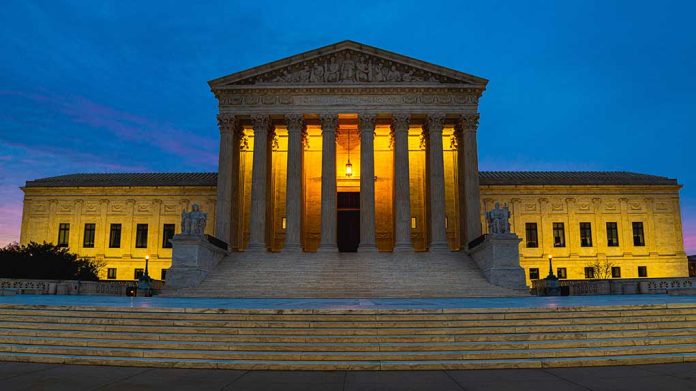
The Supreme Court prepares to hear a case that could determine the fate of flavored e-cigarettes, pitting public health concerns against market demands.
At a Glance
- Supreme Court to review FDA’s ban on flavored vape products
- Case examines FDA’s role in approving new tobacco products
- Vape manufacturers argue flavored products aid in smoking cessation
- FDA cites potential health risks and youth appeal as reasons for rejection
- Decision could impact regulatory authority and process
Supreme Court Takes On Flavored Vapes Controversy
The U.S. Supreme Court is set to hear arguments in a case that challenges the Food and Drug Administration’s (FDA) authority to reject flavored e-cigarette products. This case brings to the forefront the ongoing debate between public health concerns and the vaping industry’s market interests. The court’s decision could have far-reaching implications for both the regulatory landscape and the e-cigarette market.
At the heart of the dispute are companies like Triton Distribution and Vapestasia, which produce various flavored e-liquids. These manufacturers argue that their products play a crucial role in helping smokers quit traditional cigarettes. However, the FDA has consistently declined to approve flavored vapes, citing potential health risks and the possibility of encouraging youth tobacco use.
FDA to ask Supreme Court to uphold ban on sweet, flavored vapes https://t.co/vKxF98jhvO pic.twitter.com/UWns7W6puA
— New York Post (@nypost) November 28, 2024
FDA’s Stance on Public Health Protection
The FDA’s position is rooted in its mandate under the 2009 Family Smoking Prevention and Tobacco Control Act. This legislation requires FDA approval for new tobacco products, ensuring they are appropriate for public health protection. Since 2016, when the FDA began regulating vape products, it has rejected over a million applications for flavored vapes. ” The FDA denied marketing authorization because it found insufficient evidence that the benefits provided by the flavored e-cigarette products outweighed the risks they posed,” stated Solicitor General Elizabeth Prelogar.
The FDA maintains that applications were rejected due to insufficient evidence supporting the companies’ claims about the products’ benefits. While the agency has approved some menthol and tobacco-flavored e-cigarettes, it has taken a hard line against other flavors, particularly those that might appeal to younger users.
Vape Industry’s Counter-Arguments
Vape manufacturers argue that their products serve a vital role in helping smokers quit traditional cigarettes. They contend that the FDA changed its evaluation standards without proper notice, violating the Administrative Procedure Act. The companies have proposed measures to prevent youth access while still providing options for adult smokers seeking to quit.
The legal battle has seen mixed results across the country, with the FDA winning most cases. However, Triton Distribution and Vapetasia succeeded in the Court of Appeals for the Fifth Circuit, which criticized the FDA’s process. This split in lower court decisions has prompted the Supreme Court to step in and provide clarity on the issue.
Broader Implications and Political Context
The Supreme Court’s decision will not only affect the vaping industry but could also set precedents for regulatory authority and processes. The court will determine if the FDA’s actions were “arbitrary and capricious,” a standard used to evaluate agency decisions. This ruling could have far-reaching effects on how federal agencies implement regulations across various sectors.
Adding to the complexity of the situation is the change in leadership at the Department of Health and Human Services. President-elect Donald Trump’s nomination of Robert F. Kennedy Jr. to lead the department could signal a shift in approach to public health policy, including the regulation of e-cigarettes.
As the Supreme Court prepares to hear this case, both sides eagerly await a decision that could reshape the landscape of the e-cigarette industry and public health policy for years to come. The ruling will likely have significant implications for smokers, the vaping industry, and public health advocates alike.
Sources:
Supreme Court hears fight over FDA’s refusal to approve flavored vapes
Supreme Court to hear arguments in case over FDA denials of flavored vapes
Flavored vape products dispute goes before US Supreme Court














